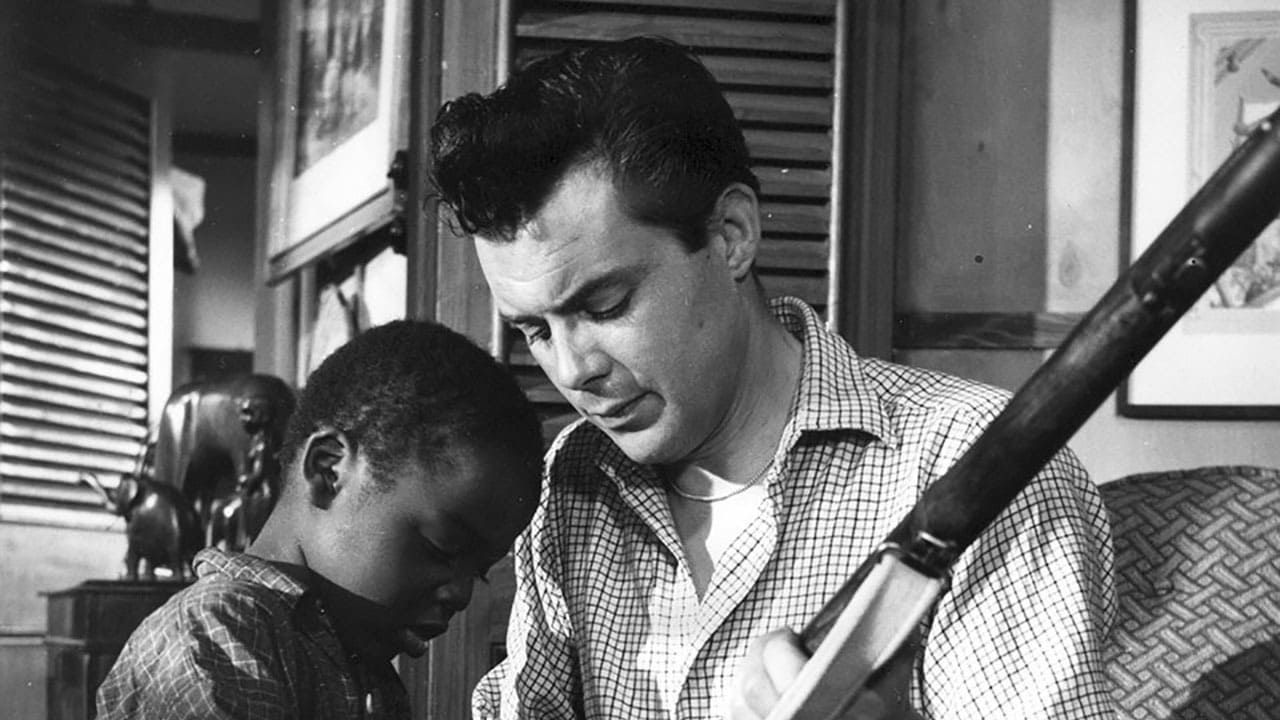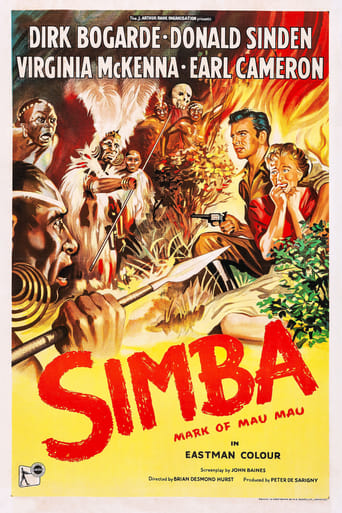

Expected more
... View MoreThe movie turns out to be a little better than the average. Starting from a romantic formula often seen in the cinema, it ends in the most predictable (and somewhat bland) way.
... View MoreClose shines in drama with strong language, adult themes.
... View MoreThe best films of this genre always show a path and provide a takeaway for being a better person.
... View MoreDespite the noble attempts at even-handedness in handling racial conflicts in 1950s Kenya (Earl Cameron is a commanding presence as a pacifist, educated doctor), "Simba" still has a racist and imperialist point-of-view: most of the black characters indeed are, or are quick to become, "howling savages". If you can overlook that, it's a well-made piece of work, vividly photographed in Eastmancolor and with some tense suspense sequences. **1/2 ouf 4.
... View MoreI don't intend to review the film in its entirety, but rather discuss its treatment of race relations. There is little doubt that it was transgressive by the standards of its time, and, also, it was incredibly raw and often offensive in terms of rank racism, but it was also refreshingly honest and unvarnished. We saw the ugliness for what it was on all sides. We saw the complication. We saw how truly decent people could hold a variety of view and then change them for the better. Most importantly,we saw humanity. I don't think we can achieve that by sanitizing and political correctness. I am grateful that this film is available for viewing and consideration. Just the notion of an accomplished black doctor standing up to a white man in such an astonishing way circa 1955 was amazing. We didn't see anything like it until Sydney Poitier uttered his famous line, "They call me Mr. Tibbs."
... View MoreThis film was set in Kenya during the middle of the decade-long Mau Mau uprising--a radical movement bent on self-rule through occasionally violent actions. Interestingly, the actual number of Europeans killed by the Mau Maus was very tiny and the number of suspected Mau Maus killed by the British colonial government very, very large--though the intensity of the anti-Mau Mau actions were minimized in "Simba". From this film's standpoint, it appears that the lion's share of the killings were by Mau Maus and its sympathies appear to be more with the white settlers.The story begins with Dirk Bogarde coming to Kenya to see his brother. Sadly, the man was killed just before Bogarde's arrival. Viewers' attitudes about the killing quickly change from outrage or sadness to understanding why it occurred, as you hear the imperialists referring to the natives in such paternalistic and pejorative terms. I loved how during a dinner party, the white Africans sat there talking about how stupid and child-like the blacks were--as several black servants stood there among the guests listening!! Heck, had I been one of these black men, I would have probably lopped off a few heads....or at least tinkled in their drinks! So, even though some accuse the film of minimizing the evil of colonialism, this was still a very gripping and poignant scene, as the white settlers were so oblivious and cruel. I commend this film in showing this, as although it tends to favor the colonials, it is not without criticism for them as well. I can't believe these scenes were not intended to provide some balance....some.As for Bogarde, in some ways he's likable. However, he's also angry and filled with hate for the Mau Mau--which is natural considering the film begins with the murder of his brother and other friends are killed throughout the film. But, since it's often an action film, you also don't get a great chance to see what a fine actor Bogarde was. However, despite this, it's a good and often exciting film--even with its faults.By the way, there was a bit of a mistake in the film. A man was drenched in blood and had dragged himself along the ground--yet there was no blood trail at all in this scene. Not a huge mistake...but a mistake.Most Americans know nothing about the Mau Mau uprising nor a lot about colonialism in Africa. So, from this standpoint it's nice to see a film that actually addresses it--even if it is biased (and most any film would have been). As more of an outsider, I certainly could NOT condone colonialism and the paternalistic notion that the Africans were so 'childish' that they needed enlightened white men to 'care for them'! Sadly, though, as a history teacher I know that in many cases the self-rule that followed colonialism was as bad--if not worse (amazing atrocities in Sudan, Rwanda and Uganda quickly come to mind)! I am not defending colonialism--just making a comment about the sometimes horrific governments that have taken its place.
... View MoreThis movie has just been issued on an R4 PAL disc available through Australian retailers so it's nice to see a pristine copy of it at last rather than a very well worn Beta tape. It has come in for some unfair criticism as a racist tract which it isn't at all. The good or bad old Colonial days existed, like it or not, and its just anachronistic to apply todays values to life some 50 years ago.The film makes the Mau Mau out to be the villains, the Hamas of their day,and so thought the settlers. Only the most prescient of them saw independence ahead; this is set several years before McMillan's Winds of Change speech. Rank stalwarts Borgade and McKenna give good performances as lovers and besieged farmers and Donald Sinden looks great as the local police chief. View it for what it is. We can't erase history, good or bad, like we can airbrush cigarettes from old photos.
... View More